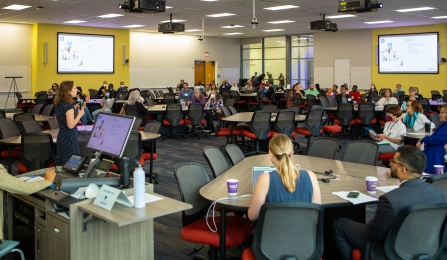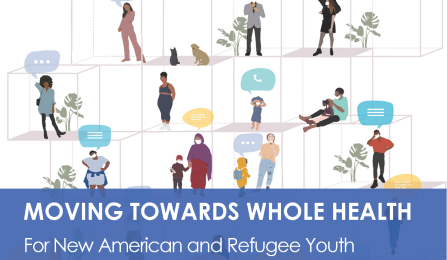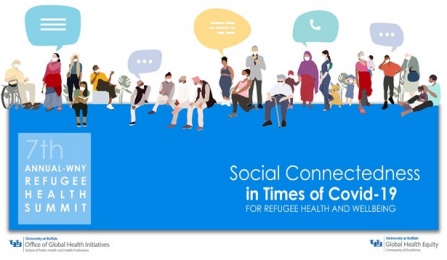Refugee Health

Attendees listen to a speaker at the 8th Annual Refugee Health Summit.
The Office of Global Health Initiatives (OGHI) and the Community for Global Health Equity (CGHE) host the Annual WNY Refugee Health Summit to unite refugees, resettlement representatives, community leaders, clinicians and scholars in pursuit of better health and wellbeing for new Americans.
About the Annual WNY Refugee Health Summit
The first Annual WNY Refugee Health Summit was hosted by the Office of Global Health Initiatives in 2014. Since its inception, the Summit has been a collaborative endeavor with the goals of improving access to culturally engaged healthcare, supporting healthy home environments, and addressing youth-specific health and wellness challenges among refugees and new Americans.
Community partners play an essential role in the Annual WNY Refugee Health Summit. Each event follows many months of listening, learning, and meeting with members of the refugee community, resettlement agency representatives, community leaders and others. The Community for Global Health Equity--comprised of faculty experts from across the university--initiate these conversations and take a leadership role in the summit. Additional information on past listening sessions, community partners, faculty research, and policy recommendations is available on CGHE's Annual Refugee Health Summit webpage.
About refugees: A refugee is someone who is forced to leave their home country due to violence, war, or social, racial, ethnic, religious or political persecution. Each year, refugees from Afghanistan, Burma, the Democratic Republic of the Congo, Somalia, Syria, Ukraine, and many other countries make a new home in Western New York. Refugees in Buffalo have contributed to the city's population growth for the first time in decades, started businesses that positively impact the local economy and enhanced the cultural landscape of the region.

The 8th Annual WNY Refugee Health Summit highlighted the spirit and adaptability of youth who arrived as refugees, while addressing health and wellbeing issues specific to their age group. Refugee and New American youth face unique challenges as they navigate different cultures and environments, growing up in a different society from their parents. The Summit examined a variety of Buffalo programs that support refugee youth, and addressed challenges and responses to a variety of issues, including mental health challenges, cultural barriers between older and younger generations, difficulty navigating higher education, and accessing culturally appropriate care.
Co-produced by community and university partners, the summit created a space for conversation among refugee communities, clinicians, resettlement agencies, community health workers, educators, researchers, students, and municipal leaders.
Organizers included leaders from the refugee community, representatives from the Community for Global Health Equity, Food Systems Planning and Healthy Communities Lab, School of Architecture and Planning, the Office of Global Health Initiatives, the Human Rights Initiative at the Jacobs School of Medicine and Biomedical Sciences, and the Immigrant and Refugee Research Institute at the School of Social Work.

The 7th Annual WNY Refugee Health Summit highlighted responses to pandemic-induced social isolation, with a focus on partnerships seeking to improve educational environments, support mental health care, and build culturally holistic care models.
Having fled war, persecution, and torture, Buffalo’s population of people that arrived as refugees are revitalizing and diversifying Buffalo, yet challenges remain for both Buffalo and its newest residents. As the United States has one of the most individualistic cultures in the world, people who arrived in the country as refugees sometimes found the separation necessitated by the pandemic even more jarring than those born in the US.
While the Covid-19 pandemic left many disconnected, individuals and organizations—both formal and informal—in Buffalo engaged the refugee community in various ways. Throughout the Covid-19 pandemic, innovative community partnerships, policies and programs have been implemented to support resettled people.
Read more about the summit, including information about the speakers, on the Community for Global Health Equity website.
The 6th Annual WNY Refugee Health Summit was an opportunity for New Americans, health care providers, and researchers to convene, and collaboratively explore ways in which housing can be a lever for improving health in Buffalo, NY. Poor housing conditions - exposure to toxins, insufficient daylight, inadequate ventilation and insulation, isolation or crowding - are associated with respiratory infections, lead poisoning, and mental health. Quality affordable housing is also becoming scarce - lessees may not know their rights and fall victim to property owner violations. In advance of the summit, New Americans sought more adequate training on their rights and opportunities. Current and future health care providers sought to understand the link between the home environment and health, and researchers sought to uncover deep connections between the built environment and health. The 2019 Summit: explored the links between housing and health, recommended policies to improve housing for better health of refugees, and identified innovative practices that improve mental and physical health for New Americans.
Read more about the summit on the Center for Global Health Equity's website, or read the report below:
The 5th annual WNY Refugee Health Summit highlighted university-community partnerships that seek to build culturally competent environments, improve clinic operations, improve mental health care, advocate for positive change in Medicaid, and support rising leaders. Read more about the summit on the Center for Global Health Equity's website, or read the reports below:
The Annual Western New York Refugee Health Summits would not be possible without support from our community partners.
- BestSelf Behavioral Health
- Buffalo Public Schools
- Buffalo Immigrant and Refugee Empowerment Coalition (BIREC)
- Burmese Community Support Center
- Catholic Charities of Buffalo
- Community Health Center of Buffalo
- H.E.A.L. International
- International Institute of Buffalo
- Jericho Road Community Health Center
- Jericho Road Ministries
- Jewish Family Services of WNY
- Journey’s End Refugee Services, Inc.
- Neighborhood Health Center
- New York State Department of Health
- Providence Farm Collective
- WNY Center for Survivors of Torture (administered through the Refugee & Immigrant Center for Healing (R.I.C.H.) at Jewish Family Services of WNY
- UB Schools of: Dental Medicine, Management, Medicine and Biomedical Sciences, Nursing, Pharmacy and Pharmaceutical Sciences, Social Work
Enroll in the OGHI's micro-credential and contribute to a future Refugee Health Summit and/or enroll in CHB 522 "Refugee Health."